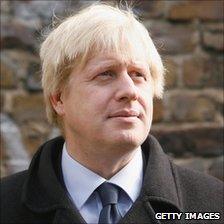Majority vote for Bristol elected mayor
- Published

Most were in favour of a figure with powers similar to Boris Johnson
The majority of people who took part in a council consultation have voted in favour of an elected mayor in Bristol.
Almost three quarters of the 870 people who responded wanted a figure with powers similar to London mayor Boris Johnson.
But the city council's chief executive is recommending that a leader and cabinet executive model should be adopted.
The government is proposing a referendum on the issue by May 2012.
The Localism Bill, which is due to be published later this month, will lay out details of proposed powers of city mayors and a referendum timetable for 12 cities in England.
Councillors are due to meet on Tuesday to discuss chief executive Jan Ormondroyd's report.
The consultation took place from 1 October to 28 October.
'Legislative change'
The report said 74.1% of people who responded to the consultation were in favour of an elected mayor, 23.3% were in favour of a leader and cabinet and 2.5% had no preference.
Under the model recommended by Ms Ormondroyd, the leader will be appointed for up to four years and a deputy leader will have powers to act in the absence of the leader.
The report adds: "This model of governance is recommended by the chief executive as most likely to bring about improvements in service delivery at a time of legislative change and within a complex budgetary situation."
At present, a leader is appointed until the end of the municipal year, and a deputy leader has no formal powers to act in the absence of the leader.
Bristol blogger Jaya Chakrabarti has been running an online campaign for a mayor in the city.
She said a mayor would address issues of transport and education for Bristol.
Liberal Democrat Barbara Janke, leader of the council, said she was against the idea, and believed it would give too much power to an individual.
She said the council already had good leadership and an elected mayor would cost too much and not change anything.
- Published9 November 2010
- Published4 October 2010